Chantilly, Virginia, USA, 31 May-3 June 2012
Final List of Participants
Chairman
| FRA | Castries, Henri de | Chairman and CEO, AXA Group |
| DEU | Ackermann, Josef | Chairman of the Management Board and the Group Executive Committee, Deutsche Bank AG |
| GBR | Agius, Marcus | Chairman, Barclays plc |
| USA | Ajami, Fouad | Senior Fellow, The Hoover Institution, Stanford University |
| USA | Alexander, Keith B. | Commander, US Cyber Command; Director, National Security Agency |
| INT | Almunia, Joaquín | Vice-President – Commissioner for Competition, European Commission |
| USA | Altman, Roger C. | Chairman, Evercore Partners |
| PRT | Amado, Luís | Chairman, Banco Internacional do Funchal (BANIF) |
| NOR | Andresen, Johan H. | Owner and CEO, FERD |
| FIN | Apunen, Matti | Director, Finnish Business and Policy Forum EVA |
| TUR | Babacan, Ali | Deputy Prime Minister for Economic and Financial Affairs |
| PRT | Balsemão, Francisco Pinto | President and CEO, Impresa; Former Prime Minister |
| FRA | Baverez, Nicolas | Partner, Gibson, Dunn & Crutcher LLP |
| FRA | Béchu, Christophe | Senator, and Chairman, General Council of Maine-et-Loire |
| BEL | Belgium, H.R.H. Prince Philippe of | |
| TUR | Berberoğlu, Enis | Editor-in-Chief, Hürriyet Newspaper |
| ITA | Bernabè, Franco | Chairman and CEO, Telecom Italia |
| GBR | Boles, Nick | Member of Parliament |
| SWE | Bonnier, Jonas | President and CEO, Bonnier AB |
| NOR | Brandtzæg, Svein Richard | President and CEO, Norsk Hydro ASA |
| AUT | Bronner, Oscar | Publisher, Der Standard Medienwelt |
| SWE | Carlsson, Gunilla | Minister for International Development Cooperation |
| CAN | Carney, Mark J. | Governor, Bank of Canada |
| ESP | Cebrián, Juan Luis | CEO, PRISA; Chairman, El País |
| AUT | Cernko, Willibald | CEO, UniCredit Bank Austria AG |
| FRA | Chalendar, Pierre André de | Chairman and CEO, Saint-Gobain |
| DNK | Christiansen, Jeppe | CEO, Maj Invest |
| RUS | Chubais, Anatoly B. | CEO, OJSC RUSNANO |
| CAN | Clark, W. Edmund | Group President and CEO, TD Bank Group |
| GBR | Clarke, Kenneth | Member of Parliament, Lord Chancellor and Secretary of Justice |
| USA | Collins, Timothy C. | CEO and Senior Managing Director, Ripplewood Holdings, LLC |
| ITA | Conti, Fulvio | CEO and General Manager, Enel S.p.A. |
| USA | Daniels, Jr., Mitchell E. | Governor of Indiana |
| USA | DeMuth, Christopher | Distinguished Fellow, Hudson Institute |
| USA | Donilon, Thomas E. | National Security Advisor, The White House |
| GBR | Dudley, Robert | Group Chief Executive, BP plc |
| ITA | Elkann, John | Chairman, Fiat S.p.A. |
| DEU | Enders, Thomas | CEO, Airbus |
| USA | Evans, J. Michael | Vice Chairman, Global Head of Growth Markets, Goldman Sachs & Co. |
| AUT | Faymann, Werner | Federal Chancellor |
| DNK | Federspiel, Ulrik | Executive Vice President, Haldor Topsøe A/S |
| USA | Ferguson, Niall | Laurence A. Tisch Professor of History, Harvard University |
| GBR | Flint, Douglas J. | Group Chairman, HSBC Holdings plc |
| CHN | Fu, Ying | Vice Minister of Foreign Affairs |
| IRL | Gallagher, Paul | Former Attorney General; Senior Counsel |
| USA | Gephardt, Richard A. | President and CEO, Gephardt Group |
| GRC | Giannitsis, Anastasios | Former Minister of Interior; Professor of Development and International Economics, University of Athens |
| USA | Goolsbee, Austan D. | Professor of Economics, University of Chicago Booth School of Business |
| USA | Graham, Donald E. | Chairman and CEO, The Washington Post Company |
| ITA | Gruber, Lilli | Journalist – Anchorwoman, La 7 TV |
| INT | Gucht, Karel de | Commissioner for Trade, European Commission |
| NLD | Halberstadt, Victor | Professor of Economics, Leiden University; Former Honorary Secretary General of Bilderberg Meetings |
| USA | Harris, Britt | CIO, Teacher Retirement System of Texas |
| USA | Hoffman, Reid | Co-founder and Executive Chairman, LinkedIn |
| CHN | Huang, Yiping | Professor of Economics, China Center for Economic Research, Peking University |
| USA | Huntsman, Jr., Jon M. | Chairman, Huntsman Cancer Foundation |
| DEU | Ischinger, Wolfgang | Chairman, Munich Security Conference; Global Head Government Relations, Allianz SE |
| RUS | Ivanov, Igor S. | Associate member, Russian Academy of Science; President, Russian International Affairs Council |
| FRA | Izraelewicz, Erik | CEO, Le Monde |
| USA | Jacobs, Kenneth M. | Chairman and CEO, Lazard |
| USA | Johnson, James A. | Vice Chairman, Perseus, LLC |
| USA | Jordan, Jr., Vernon E. | Senior Managing Director, Lazard |
| USA | Karp, Alexander | CEO, Palantir Technologies |
| USA | Karsner, Alexander | Executive Chairman, Manifest Energy, Inc |
| FRA | Karvar, Anousheh | Inspector, Inter-ministerial Audit and Evaluation Office for Social, Health, Employment and Labor Policies |
| RUS | Kasparov, Garry | Chairman, United Civil Front (of Russia) |
| GBR | Kerr, John | Independent Member, House of Lords |
| USA | Kerry, John | Senator for Massachusetts |
| TUR | Keyman, E. Fuat | Director, Istanbul Policy Center and Professor of International Relations, Sabanci University |
| USA | Kissinger, Henry A. | Chairman, Kissinger Associates, Inc. |
| USA | Kleinfeld, Klaus | Chairman and CEO, Alcoa |
| TUR | Koç, Mustafa | Chairman, Koç Holding A.Ş. |
| DEU | Koch, Roland | CEO, Bilfinger Berger SE |
| INT | Kodmani, Bassma | Member of the Executive Bureau and Head of Foreign Affairs, Syrian National Council |
| USA | Kravis, Henry R. | Co-Chairman and Co-CEO, Kohlberg Kravis Roberts & Co. |
| USA | Kravis, Marie-Josée | Senior Fellow, Hudson Institute |
| INT | Kroes, Neelie | Vice President, European Commission; Commissioner for Digital Agenda |
| USA | Krupp, Fred | President, Environmental Defense Fund |
| INT | Lamy, Pascal | Director-General, World Trade Organization |
| ITA | Letta, Enrico | Deputy Leader, Democratic Party (PD) |
| ISR | Levite, Ariel E. | Nonresident Senior Associate, Carnegie Endowment for International Peace |
| USA | Li, Cheng | Director of Research and Senior Fellow, John L. Thornton China Center, Brookings Institution |
| USA | Lipsky, John | Distinguished Visiting Scholar, Johns Hopkins University |
| USA | Liveris, Andrew N. | President, Chairman and CEO, The Dow Chemical Company |
| DEU | Löscher, Peter | President and CEO, Siemens AG |
| USA | Lynn, William J. | Chairman and CEO, DRS Technologies, Inc. |
| GBR | Mandelson, Peter | Member, House of Lords; Chairman, Global Counsel |
| USA | Mathews, Jessica T. | President, Carnegie Endowment for International Peace |
| DEN | Mchangama, Jacob | Director of Legal Affairs, Center for Political Studies (CEPOS) |
| CAN | McKenna, Frank | Deputy Chair, TD Bank Group |
| USA | Mehlman, Kenneth B. | Partner, Kohlberg Kravis Roberts & Co. |
| GBR | Micklethwait, John | Editor-in-Chief, The Economist |
| FRA | Montbrial, Thierry de | President, French Institute for International Relations |
| PRT | Moreira da Silva, Jorge | First Vice-President, Partido Social Democrata (PSD) |
| USA | Mundie, Craig J. | Chief Research and Strategy Officer, Microsoft Corporation |
| DEU | Nass, Matthias | Chief International Correspondent, Die Zeit |
| NLD | Netherlands, H.M. the Queen of the | |
| ESP | Nin Génova, Juan María | Deputy Chairman and CEO, Caixabank |
| IRL | Noonan, Michael | Minister for Finance |
| USA | Noonan, Peggy | Author, Columnist, The Wall Street Journal |
| FIN | Ollila, Jorma | Chairman, Royal Dutch Shell, plc |
| USA | Orszag, Peter R. | Vice Chairman, Citigroup |
| GRC | Papalexopoulos, Dimitri | Managing Director, Titan Cement Co. |
| NLD | Pechtold, Alexander | Parliamentary Leader, Democrats ’66 (D66) |
| USA | Perle, Richard N. | Resident Fellow, American Enterprise Institute |
| NLD | Polman, Paul | CEO, Unilever PLC |
| CAN | Prichard, J. Robert S. | Chair, Torys LLP |
| ISR | Rabinovich, Itamar | Global Distinguished Professor, New York University |
| GBR | Rachman, Gideon | Chief Foreign Affairs Commentator, The Financial Times |
| USA | Rattner, Steven | Chairman, Willett Advisors LLC |
| CAN | Redford, Alison M. | Premier of Alberta |
| CAN | Reisman, Heather M. | CEO, Indigo Books & Music Inc. |
| DEU | Reitzle, Wolfgang | CEO & President, Linde AG |
| USA | Rogoff, Kenneth S. | Professor of Economics, Harvard University |
| USA | Rose, Charlie | Executive Editor and Anchor, Charlie Rose |
| USA | Ross, Dennis B. | Counselor, Washington Institute for Near East Policy |
| POL | Rostowski, Jacek | Minister of Finance |
| USA | Rubin, Robert E. | Co-Chair, Council on Foreign Relations; Former Secretary of the Treasury |
| NLD | Rutte, Mark | Prime Minister |
| ESP | Sáenz de Santamaría Antón, Soraya | Vice President and Minister for the Presidency |
| NLD | Scheffer, Paul | Professor of European Studies, Tilburg University |
| USA | Schmidt, Eric E. | Executive Chairman, Google Inc. |
| AUT | Scholten, Rudolf | Member of the Board of Executive Directors, Oesterreichische Kontrollbank AG |
| FRA | Senard, Jean-Dominique | CEO, Michelin Group |
| USA | Shambaugh, David | Director, China Policy Program, George Washington University |
| INT | Sheeran, Josette | Vice Chairman, World Economic Forum |
| FIN | Siilasmaa, Risto | Chairman of the Board of Directors, Nokia Corporation |
| USA | Speyer, Jerry I. | Chairman and Co-CEO, Tishman Speyer |
| CHE | Supino, Pietro | Chairman and Publisher, Tamedia AG |
| IRL | Sutherland, Peter D. | Chairman, Goldman Sachs International |
| USA | ||



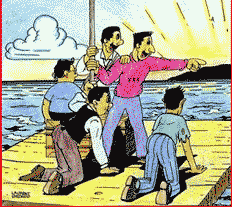
 To ou
To ou


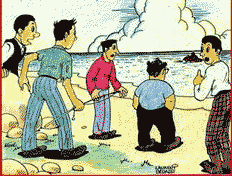
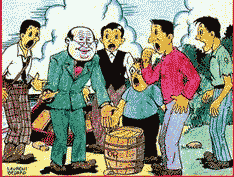 “Mr. Oliver, as our banker, your only occupation on this island will be to look after our money; no manual labour.”
“Mr. Oliver, as our banker, your only occupation on this island will be to look after our money; no manual labour.” Before they went their separate ways for the night, Oliver asked them one last question.
Before they went their separate ways for the night, Oliver asked them one last question. As for Oliver, he wasted not a moment. Fatigue was forgotten in the interests of his future as a banker. By dawn's first light, he dug a pit into which he rolled the barrel. He then filled it in, transplanting a small shrub to the spot about which he carefully arranged sod. It was well hidden.
As for Oliver, he wasted not a moment. Fatigue was forgotten in the interests of his future as a banker. By dawn's first light, he dug a pit into which he rolled the barrel. He then filled it in, transplanting a small shrub to the spot about which he carefully arranged sod. It was well hidden. Five bundles of new banknotes were sitting on the table.
Five bundles of new banknotes were sitting on the table. And so Oliver's money went into circulation on the island. Trade, simplified by money, doubled. Everybody was happy.
And so Oliver's money went into circulation on the island. Trade, simplified by money, doubled. Everybody was happy. Oliver guessed what was on their minds, but he put on his best front. While he listened, the impetuous Frank stated the case for the group.
Oliver guessed what was on their minds, but he put on his best front. While he listened, the impetuous Frank stated the case for the group. Oliver is alone. He is deep in reflection. His thoughts run thus:
Oliver is alone. He is deep in reflection. His thoughts run thus: Meanwhile, things went from bad to worse on Salvation Island. Production was up, and bartering had dropped to a minimum. Oliver collected his interest regularly. The others had to think of setting money aside for him. Thus, money tended to clot instead of circulating freely.
Meanwhile, things went from bad to worse on Salvation Island. Production was up, and bartering had dropped to a minimum. Oliver collected his interest regularly. The others had to think of setting money aside for him. Thus, money tended to clot instead of circulating freely. A veritable tempest burst about the ears of the banker.
A veritable tempest burst about the ears of the banker. “And that's a healthy monetary system, Mr. Oliver?”
“And that's a healthy monetary system, Mr. Oliver?” Oliver knew that whoever controlled the nation's money, controlled the nation. But he knew also that to maintain that control, it was necessary to keep the people in a state of ignorance, and to distract them by a variety of means.
Oliver knew that whoever controlled the nation's money, controlled the nation. But he knew also that to maintain that control, it was necessary to keep the people in a state of ignorance, and to distract them by a variety of means.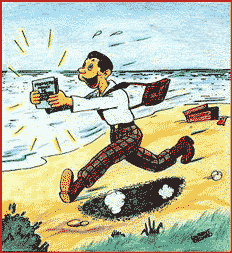 One day, Tom, the prospector, found on a small beach, hidden by tall grass at one end of the island, a lifeboat, empty except for a trunk in good condition lying in the bottom of it.
One day, Tom, the prospector, found on a small beach, hidden by tall grass at one end of the island, a lifeboat, empty except for a trunk in good condition lying in the bottom of it.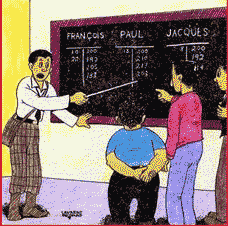 So Tom became the teacher. He taught the others what he had learned from that God-sent Social Credit publication.
So Tom became the teacher. He taught the others what he had learned from that God-sent Social Credit publication. 1966
1966 July 1973
July 1973 1991
1991 May 21, 1992
May 21, 1992